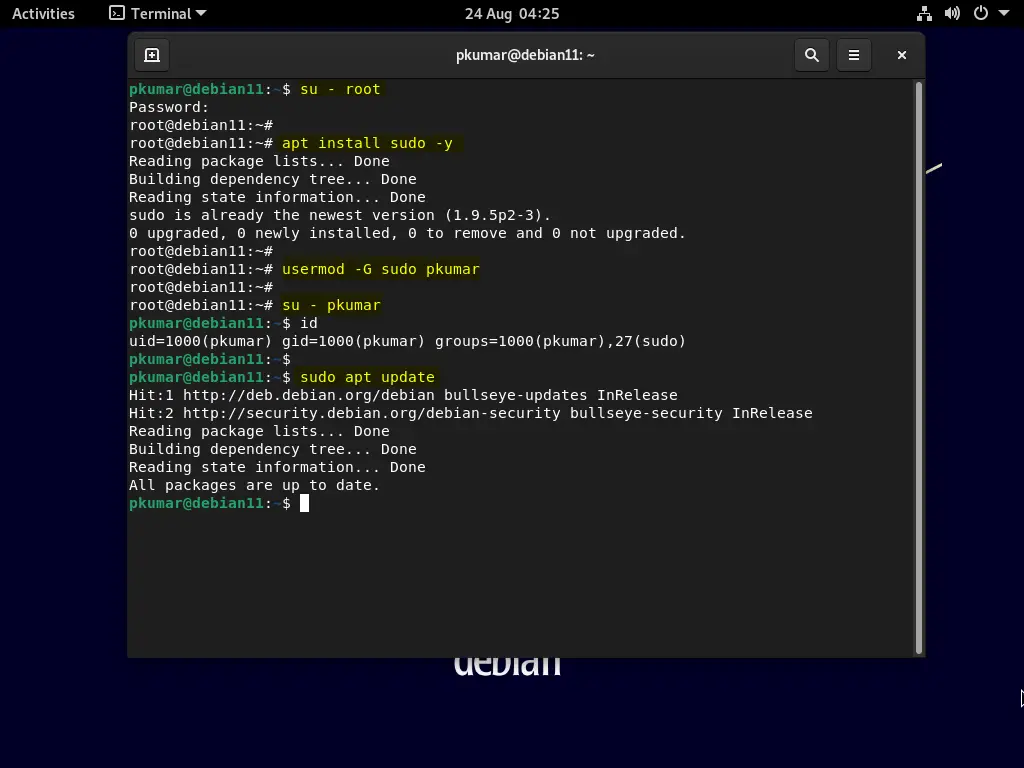How To Save Iptables Rules Debian
On the Server A the one with the iptables rules that you want to migrate use the iptables-save to export the current rules to a file named iptables-export like this. We can use iptables-save command which will save the current iptables rules into etcsysconfigiptables iptables.

Top 12 Things To Do After Installing Debian 11 Bullseye
If on a server without NetworkManager a common approach is then to use a pre-up command in etcnetworkinterfaces.

How to save iptables rules debian. I manually added a symbolic link to the etcrcSd folder for etc. Iptables-save etciptablesrulesv4 RHELCentOS. Now each time Debian boots iptables-restore command has to be called with these rules so.
Iptables-restore etciptablesconf Share Improve this answer. Netfilter encourages to use iptables-save command since it will provide you a detailed view of your built-in chains and those youve defined yourself. In Debian you must save your rules in etcnetworkif-pre-updiptables.
On recent Debian-based systems the iptables configuration can be made persistent using the iptables-persistent package. Save Ipv4 Rules in Debian Ubuntu Mint Kali. This binbash sbiniptables-restore etciptablesuprules.
This file does NOT exist and you have to create it. Save iptables rules. Chain OUTPUT policy ACCEPT target prot opt source destination.
Place the required rulesets in. This will create the iptables-export file in your home directory. This file can be used on a different server to load the firewall rules into iptables.
Write these rules to a file using the following command. Please note you need to run the above command every time you make changes to iptables on your system. How to Save iptables Firewall Rules Permanently You need to install the iptables-persistent package which will automatically restore iptables on reboot.
Once you are happy with your ruleset save the new rules to the master iptables file. But what is the standard way to run etcinitdiptables load active at boot time. Overwrite the current rules sudo iptables-restore etciptablesrulesv4 Add the new rules keeping the current ones sudo iptables-restore -n etciptablesrulesv4.
Etcsysconfigiptables etcsysconfigip6tables Make sure that you disable firewalld and enable the iptables service in systemd. Now each time Debian boots iptables-restore command has to be called with these rules so create and edit a new file as shown below. Thats of course if youre using bash and have save the rules in this way.
Select Yes or No depend on your needs. I made it save in the active rule set. If you want to get a human readable view you can use iptables -L -v -n --line-n.
Here is how to keep them persistent between reboots so we dont lost them after the system is rebooted. These can be saved in a file with the command iptables-save for IPv4. Once you have identified the line number of the rule you would like to replace run iptables -R.
The actual iptables rules are created and customized on the command line with the command iptables for IPv4 and ip6tables for IPv6. Cd sudo iptables-save iptables-export. If we just modify iptables rules by using iptables commands on DebianUbuntu systems after reboot those rules will be lost.
Sudo iptables-save etciptablesrulesv4 You can then simply restore the saved rules by reading the file you saved. Iptables-save etciptablesconf Add the following command in etcrclocal to reload the rules in every reboot. Ignore library files one of the file it opens to read will be the ruleset you are looking for.
Chain OUTPUT policy ACCEPT target prot opt source destination. Apt-get install iptables-persistent This package first became available in Debian Squeeze and Ubuntu Lucid. The -L -n and -v options provided.
Run strace iptables-save and look through the output for the files that this command opens. Here is how to keep them persistent between reboots so we dont lost them after the system is rebooted. Iptables-save etcnetworkiptablesrules The output created by iptables-save can then by read on stdin by iptables-restore.
1 Install iptables-persistent sudo apt install -y iptables-save sudo apt install -y iptables-persistent We will be asked to save currentexisting iptables rules Select Yes or No depend on your needs. To prevent this save the rules to a file. 1 Install iptables-persistent sudo apt install -y iptables-save sudo apt install -y iptables-persistent.
Open terminal and run the following command to save iptables configuration to a file of your choice eg. The -L option is used to list iptables rules -n option is used to. Share Improve this answer.
Etciptablesconf sudo iptables-save etciptablesconf. Before saving the iptables rules we can list current iptables rules with the iptables command. We can use iptables-save command which will save the current iptables rules into etciptablesrulesv4 iptables-save etciptablesrulesv4 Save Ipv4 Rules in CentOS Fedora RedHat.
Any currently erected iptables rules will be saved to the corresponding IPv4 and IPv6 files below. The generic method of saving iptables rules is to use the command iptables-save which writes to stdout. First add the iptable rule using the command you gave.
Sudo apt install iptables-persistent During the process of installation you will be asked to save currentexisting iptables rules. Run iptables -L --line-numbers which will give you all the current rules as well as their rule numbers. But what is the standard way to run etcinitdiptables load active at boot time.
In your case the output to the first would be something like this greatly truncatedReviews. Iptables-save etciptablesuprules To make sure the iptables. But there are different methods to save iptables rules persistently to a disk.
The sudo command is used to provide the root privileges to access firewall rules. Write these rules to a file using the following command. Then save iptables rules to some file like etciptablesconf using following command.
I made it save in the active rule set.

Install Iptables In Debian 11 Bullseye Computer How To
Komentar
Posting Komentar